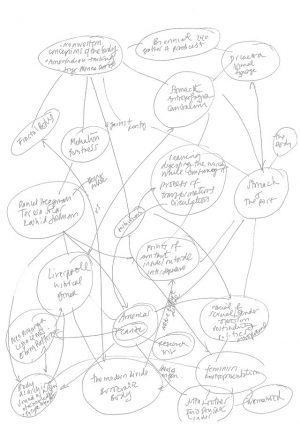The Next Biennial Should be Curated by a Machine is an inquiry into the relationship between curating and artificial intelligence, and a possibility of developing an experimental system capable of curating, based on human-machine learning principles.
Unfolding as a series of machine learning experiments, the project is a collaboration between artists UBERMORGEN, digital humanist Leonardo Impett, and curator Joasia Krysa.
The first online experiment will be launched at Liverpool Biennial 2020 and is co-commissioned by Liverpool Biennial and the Whitney Museum of American Art for its online gallery space artport.
Making reference to ‘The Next Documenta Should Be Curated by an Artist’, this project extends the proposition to machines. It asks how the counterpoint of automata might offer alien perspectives on conventional curatorial practices and curatorial knowledge. What would the next Biennial, or any large scale exhibition, be like if machines were asked to take over the curatorial process and make sense of a vast amount of art world data that far exceeds the capacity of the human curator alone?
The first web-based experiment takes a sketch of the curatorial process for Liverpool Biennial 2020, and interprets it as a technical diagram—a working basis for deriving data sets and subsequent iterative processing by machines. Expanding from this, the experiment aims to ingest data from a broad range of curatorial processes and exhibitions to generate a series of propositions, or versions of the Biennial, as a prototype for an intelligent curatorial system.
We are now inviting contributions of historical and contemporary exhibitions and biennials to be included in the experiment, and ask for submissions of related material such as images, texts, diagrams, scores, files, audio, video, accounting records, legal contracts, and contextual information by curators and art institutions. Data can be transparent, subject-anonymous, or even sender-anonymous.
Please send any expressions of interest or your data to datasets@biennial.ai, or upload them anonymously on data.biennial.ai.
Data submitted will be used for AI training purposes only, and will not be published or made accessible through the project.
UBERMORGEN is an artist duo founded in 1995 in Vienna by lizvlx & Hans Bernhard. Net.Art pioneers and media hackers, they have been widely recognized for their unsafe research into data and matter. In 2005 they launched their acclaimed series of conceptual hacks EKMRZ Trilogy – Google Will Eat Itself, Amazon Noir, The Sound of eBay.
Leonardo Impett is a digital humanist working at the intersection of computer vision and art history, currently based at the Digital Humanities Lab, Bibliotheca Hertziana – Max Planck Institute for Art History, Rome. He is a member of the Image and Visual Representation Laboratory at EPFL; Visiting Fellow at Cambridge University Digital Humanities; and Associate Researcher at the Orpheus Institute.
Joasia Krysa is a curator and researcher whose first software-kurator experiment was launched at Tate Modern in 2005 and published in Curating Immateriality (2006). She has curated exhibitions and projects at the intersection of art and technology, amongst others, for Documenta 13, as Artistic Director of Kunsthal Aarhus, Denmark, and co-curator of Liverpool Biennial 2016. She is Professor of Exhibition Research at Liverpool John Moores University, with Liverpool Biennial.
Liverpool Biennial 2020 is curated by Manuela Moscoso, with artistic director Fatoş Üstek and the Liverpool Biennial team. The Whitney Museum of American Art’s online gallery space artport is curated by Christiane Paul.


